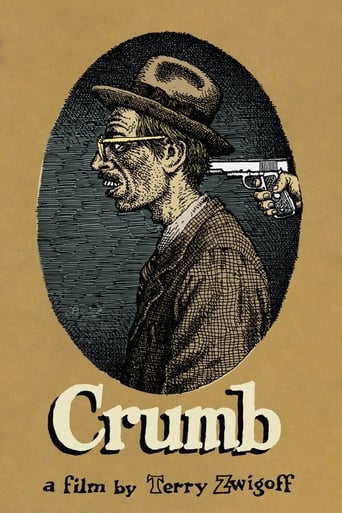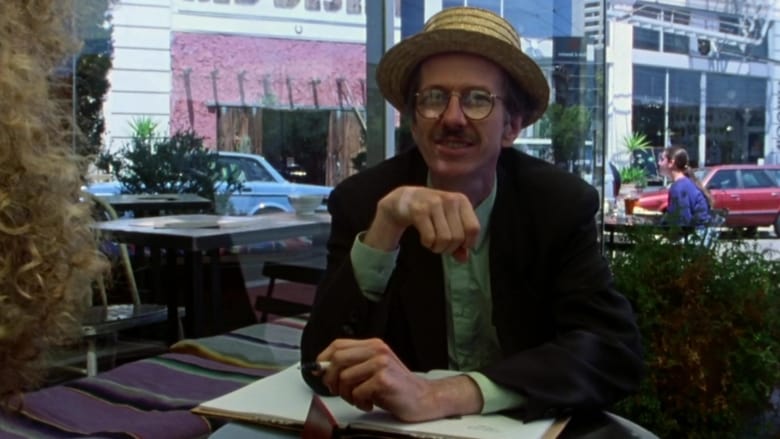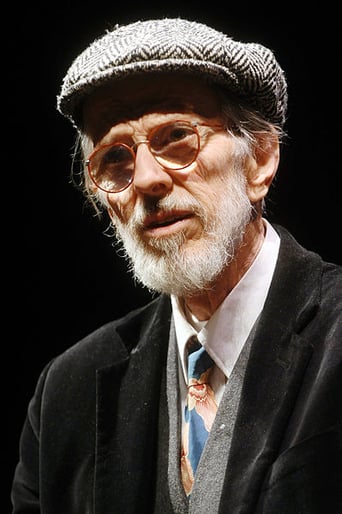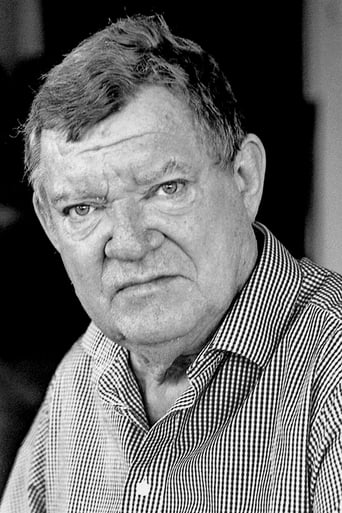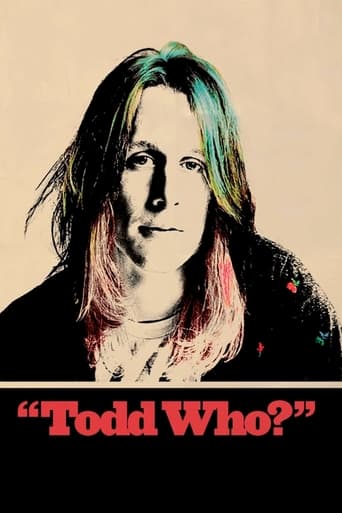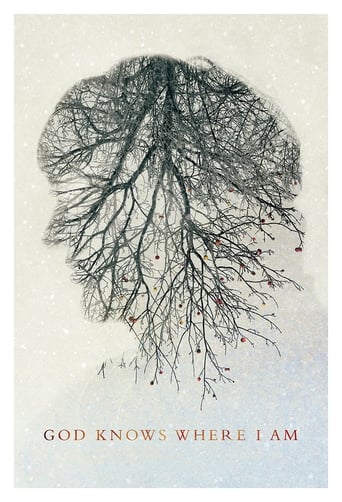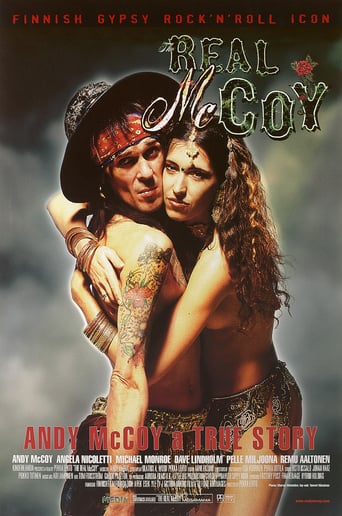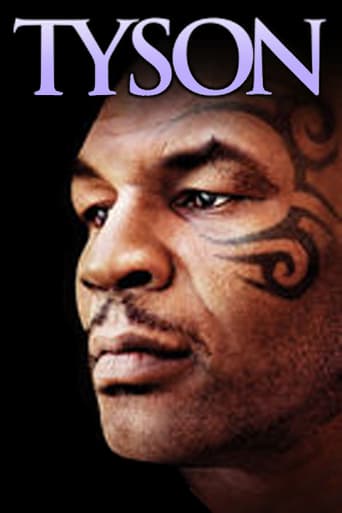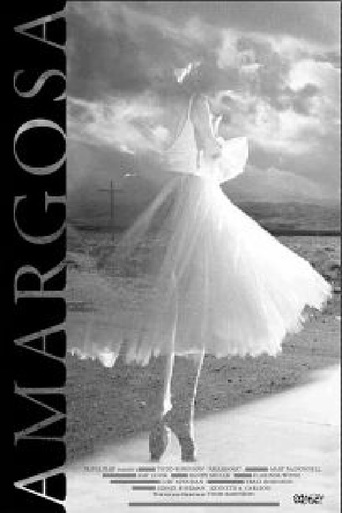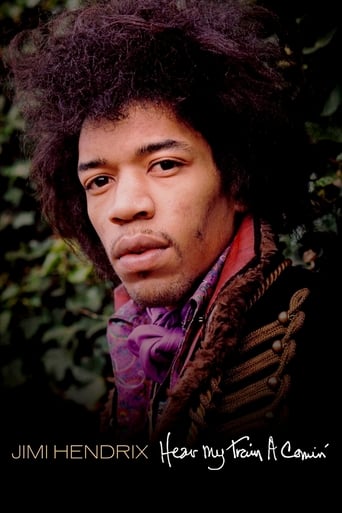Crumb (1994)
This movie chronicles the life and times of R. Crumb. Robert Crumb is the cartoonist/artist who drew Keep On Truckin', Fritz the Cat, and played a major pioneering role in the genesis of underground comix. Through interviews with his mother, two brothers, wife, and ex-girlfriends, as well as selections from his vast quantity of graphic art, we are treated to a darkly comic ride through one man's subconscious mind.
Watch Trailer
Free Trial Channels
Cast


Similar titles
Reviews
Highly Overrated But Still Good
everything you have heard about this movie is true.
It’s not bad or unwatchable but despite the amplitude of the spectacle, the end result is underwhelming.
While it is a pity that the story wasn't told with more visual finesse, this is trivial compared to our real-world problems. It takes a good movie to put that into perspective.
I always hated R. Crumb's comics, finding them misogynistic and racist and weird and unfunny. In my factory-town hippie youth, the boys who found them funny were boys I avoided. (I never met a girl or black person who did like them, though a few may exist.) So you'd think I might hate this movie, or not want to watch it, or that this review would be negative. But no. I love a good documentary and this is not merely good; it's a great one, directed by film genius Terry Zwigoff. Crumb the movie riveted me, showing me an intricate portrait of a complex man. This is not a short movie, but I was always engaged--great pacing and editing, surprising and revealing choices of scenes.To me what it says about "art" (or craft) is far less important than what it says about this one man.Crumb had a childhood that looks worse than the worst horror film I've ever seen. Bad father, bat**** crazy mother, and three genius boys that I suppose may carry the crazy gene too. As Zwigoff takes us into that bizarre home and the lives of the other brothers, we come to see that R. Crumb's art and life is a triumph of the human spirit, a flower blooming out of burbling sewage. To me, it's not an attractive flower, rather a noisome and homely thing, but dang it, a flower, and I ended up applauding him for doing so well with such beginnings.No matter how crazy your family is, you leave this film thinking, wow, thanks Mom and Dad for not being anywhere near this bad. Your own tiny neuroses will seem charming and mild in comparison to the brothers'. You leave the film with the sense that all things are possible--if Crumb did this with his life despite what you now know, what the heck is holding you back?And if a film can change people, even for a short time, this one has the capacity to make you more understanding of the worst people you meet. What if they had this much baggage? How can you possibly know what made them what they are? Everyone is doing the best s/he can, and while some days that seems like bad news, after watching the film, it feels like good news.
Robert Crumb has become an icon in the world of underground comic artists, and this documentary takes a close look at his work and the often unhappy life that informed it with an intimacy that is both gratifying and disturbing. Crumb's art and career are celebrated here on film even while his dysfunctional adolescence, his personal insecurities and his sexual obsessions are dissected by family, friends, pop psychologists and other invited crackpots. We see how, by his own understanding, that young Robert Crumb developed his talent as a vehicle to reach out and connect with other people, especially girls, and then had to deal with the frustrations resulting from his failure to achieve success with this. We see how his cartooning style evolved, how certain repeated subjects and motifs found their way into his work.We get a close up view of Robert Crumb that is almost too close up. The film's intimacy with its subject creates an almost claustrophobic feel, especially since Crumb himself is almost painfully awkward and lacking in personal charm, his mother is an ogress, his wife and daughter seem wary and stiff on camera, and his older brother is borderline crazy.Especially interesting is Robert Crumb's brother Charles, who is also a cartoonist and quite talented but clearly mentally unbalanced. His work shows genuine technical polish and is extremely evocative. It is also morbid and obsessive to the point of wallowing in darkness and despair, since its creator is an over-40, out of work dingbat who lives and works in the attic of the Crumb family home. Charles was a key inspiration to the young Robert Crumb, yet he is also an object lesson. With a little less professional drive and career focus, Robert could easily have followed his brother's path in life and art.
I was never a fan of R. Crumb's work, finding it unpleasant and ugly, but I heard the documentary was good and it certainly is. This is a fascinating portrayal not just of the highly eccentric Crumb but also of his even more off-kilter brothers. They are a very messed up family, so messed up that their upbringing was probably even worse than it is described in the movie.The film works in a number of ways. It does a good job of exploring Crumb's artwork, where it came from and how he approaches it (even though it's mainly about the personal we do see some of his craftsmanship as well. It shows how his comics generate extreme reactions, most notably in the opposing reactions of a pretentious English guy who talks about Crumb as a great artist and a painfully politically correct woman who says he legitimizes horrible fantasies by expressing them.But more than anything, this is a movie that reveals the Crumb's disturbing personalities and dismal lives. Perhaps the most disturbing thing about it is how casually they discuss themselves, laughing boisterously as they talk about their odd sexuality and abusive father.It's a rather downbeat documentary but well worth watching.
"Crumb" is an amazing documentary about an extraordinary artist. Most great movies are great because they carry kernels of truth: Fellini on sexual desire and repression, The Godfather on the vagaries of morality and business, Casablanca of things bigger than ourselves, the great (anti)war movies on how politicians and generals coldly manipulate young men and ultimately murder them, etc., etc... But the classics are stylized accounts with kernels of truth. "Crumb," in contrast, is truth through and through uncompromisingly laid open. You don't realize how rare truth is until you finally see it.Crumb's own oeuvre is a study in truth, inhabited by a menagerie of characters that haunt his subconscious: rigid "White Man," farcical hippie guru Mr. Natural, Amazonian Angel McSpade, the subhumans who beat up his brother as adolescents, and his own self-pitying self.When he became a counter culture hero, Crumb promptly put the would-be worshipers at arm's length with his openly "perverse" sexual comics. He lampooned America and its critics alike, though "lampoon" isn't quite the right word, for his powerful critiques are frequently wordless, midnight black humor, if it's humor at all (see, for example, his History of America at www.zubeworld.com/crumbmuseum/history1.html). He drew what he felt and never sold-out, even turning down a commission to draw a Rolling Stones album cover because he didn't think much of their music. During the filming of the movie, he and his wife are moving to the south of France because America has become just too ugly, commercial and crass.Interviewed in the film, he and his brothers acknowledge being unpopular wimps, abused by their father and many of their peers. Underlying the truth in his work lay the truth of his life and family, exposed with embarrassing candor. His older brother and mother never leave their small, poor home, though they have nothing in common so they just maintain an uneasy truce. His younger brother lives as a monk, drawing a long linen tape through his body to clean his intestines while sitting on a bed of nails. Neither brother has ever had sex.Crumb, it's clear, loves them, and it's a painful, poignant love because he's also detached. What can he do after all, except accept them? His work too, is poignantly portrayed: at one point he sits semi-autistic listening to soulful old records (he's a collector), with a slow panning over a collage of haunting illustrations.Crumb is routinely referred to as a pervert. And of course his family is deeply disturbed. But so is much of America. And so is much of the world. Psychiatrist Alfred Adler observed that "The only normal people are the ones you don't know very well." So of course Crumb is not normal. He has allowed us to know him.

